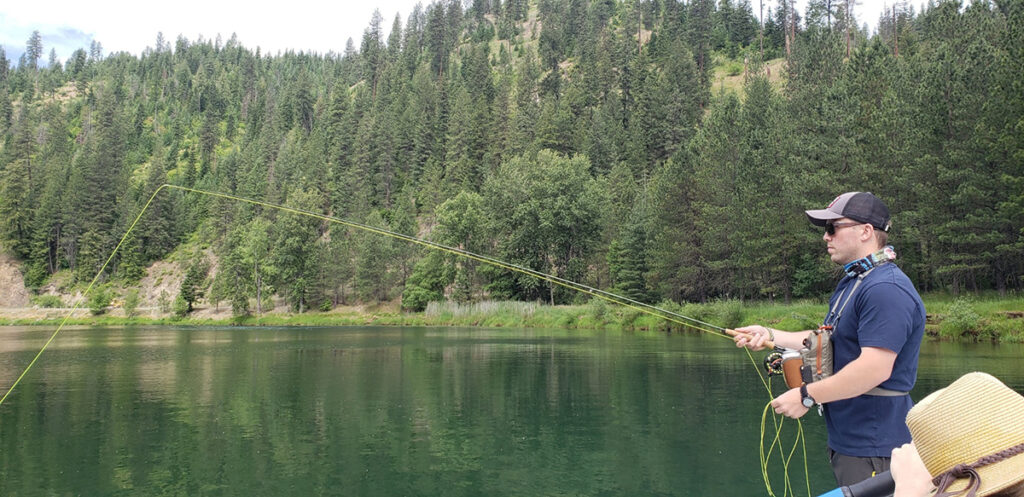By Sam Lavigne
Cover photo courtesy Sam Lavigne
People ask me why I like to fly fish. What is it about fly fishing that draws me to cold rivers at times of the day when most folks are still sleeping? I have a hard time putting it into words, but what I do know is that the more time I spend fishing, the more I want to do it.
Both of my grandfathers were fisherman, as is my father. I think that my grandfathers fished from a place of sustenance. That’s not to say that they didn’t enjoy it, but the motivation for food that had originally created the activity were at the helm.
My father is more of a recreationist. He has recently come around to fly fishing, but he used to fish exclusively with lures. He always said that he didn’t like fly fishing because he had to use both hands to do it, which meant that he didn’t have a free hand to hold a drink. I think it had more to do with a lack of instruction than anything else.
I grew up just outside of Denver in a town that was an hour drive from anything that looked even remotely fishy. It was an urban, no-pulp-in-the-orange-juice, manicured bubble in a state that touts some of the best fly waters in the West.

Even given my dad’s affinity for fishing, we hardly ever wet a line in Colorado. We spent the majority of our summers in the northern part of Idaho on a piece of riverbank that had been handed down over the course of a generation or two. This water was (still is) “our spot,” and it is where my love for fishing was conceived, incubated and molded into an obsession.
It wasn’t until I got into high school that I really began to learn to fly fish. There were several people in my family who enjoyed the idea of fly fishing (and even had some experience), but the lack of eager mentors left me holding a Zebco and a Fighting Fish—not that there is anything wrong with that. To be clear, I consider myself an angler, plain and simple. I don’t discriminate against the method. But, for some reason, the characteristics of fly fishing continue to tug at my heart. There is certain amount of romanticism that goes along with fly fishing that I didn’t understand when I first started. It’s a game of patience and efficiency rather than feckless fin chasing.
My early education consisted of two men (my grandfather and my uncle) standing on the bank shouting at me to keep my tip up. I was in my mid-teens and too impatient to understand the nuance involved. I knew less about fly fishing than I did about women, and my attention to detail was halfhearted at best.
So fly fishing didn’t consume me immediately like it does some anglers. It took me a while to develop a rapport with the activity that can oftentimes be a love-hate relationship. People spend years trying to hone the craft, but it only takes one bad outing to bring you back to reality. Sometimes the fish are biting and sometimes they aren’t. It doesn’t matter how good a fly fisherman you are—we all have days where we get skunked. I think that is part of what drives me back to the tailwaters and freestones of the Pacific Northwest.
Fly fishing still has a stranglehold on me today. Things have changed some as I have since moved closer to that revered piece of riverbank, got married, bought a house and grown the flock. But fly fishing itself remains the same. You are still just, as fly-fishing author John Geirach says, standing in a river waiving a stick.
Fisherman and author Gary LaFontaine said, “I fish because of beauty . . . and in our contentious time of partisan hubris, selfishness and outright mendacity, Beauty itself may prove the most endangered thing of all.”
I don’t consider myself to be that poetic. I think the point is, that for some people, fly fishing is something that engulfs us and alters the way we view the world and the role we play in it.
In all honesty, fly fishing is something that changed the way I live my life. It forced me to understand patience, attention to detail, the beauty of nature and the solace of a quiet trout stream. It has brought me closer to my family, and it has allowed me to spend time with the people I love. It has helped me realize that no matter how fragmented and chaotic your life gets, you can always find reprieve in a cold river. I know this is true, because on days that I don’t catch fish I am still surrounded by an atmosphere of something much larger than myself that makes me feel amazingly small.
Why the fly? Because the characteristics of being a good fly fisherman are often synonymous with those of being a good person. Frustration is almost always certain, the payoff can be tremendous, and the space in between makes you happy to be alive. Fish on.
Sam Lavigne lives in Idaho’s Silver Valley and spends his free time hunting and fly fishing with his wife and three kids. His enthusiasm for family, food and fishing drives his writing and adventures.













